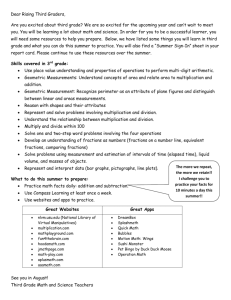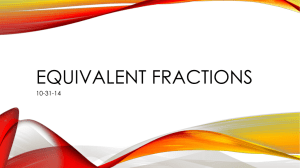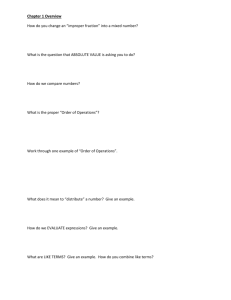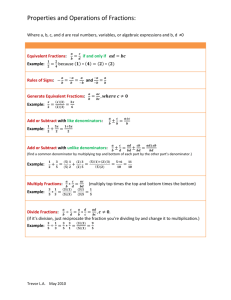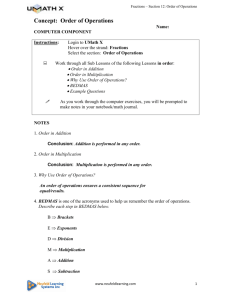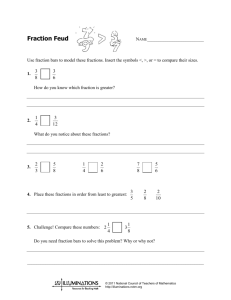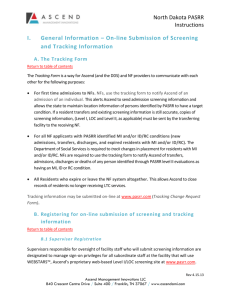Ascend Math_Summer Program Flyer
advertisement
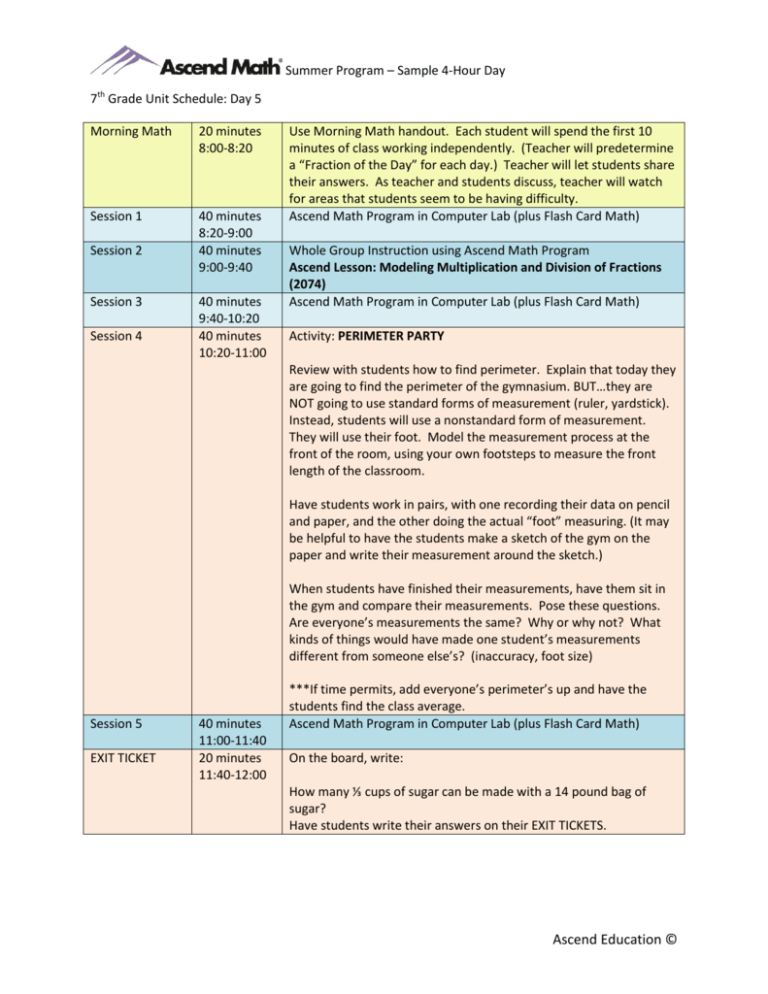
Summer Program – Sample 4-Hour Day 7th Grade Unit Schedule: Day 5 Morning Math 20 minutes 8:00-8:20 Session 1 40 minutes 8:20-9:00 40 minutes 9:00-9:40 Session 2 Session 3 Session 4 40 minutes 9:40-10:20 40 minutes 10:20-11:00 Use Morning Math handout. Each student will spend the first 10 minutes of class working independently. (Teacher will predetermine a “Fraction of the Day” for each day.) Teacher will let students share their answers. As teacher and students discuss, teacher will watch for areas that students seem to be having difficulty. Ascend Math Program in Computer Lab (plus Flash Card Math) Whole Group Instruction using Ascend Math Program Ascend Lesson: Modeling Multiplication and Division of Fractions (2074) Ascend Math Program in Computer Lab (plus Flash Card Math) Activity: PERIMETER PARTY Review with students how to find perimeter. Explain that today they are going to find the perimeter of the gymnasium. BUT…they are NOT going to use standard forms of measurement (ruler, yardstick). Instead, students will use a nonstandard form of measurement. They will use their foot. Model the measurement process at the front of the room, using your own footsteps to measure the front length of the classroom. Have students work in pairs, with one recording their data on pencil and paper, and the other doing the actual “foot” measuring. (It may be helpful to have the students make a sketch of the gym on the paper and write their measurement around the sketch.) When students have finished their measurements, have them sit in the gym and compare their measurements. Pose these questions. Are everyone’s measurements the same? Why or why not? What kinds of things would have made one student’s measurements different from someone else’s? (inaccuracy, foot size) Session 5 EXIT TICKET 40 minutes 11:00-11:40 20 minutes 11:40-12:00 ***If time permits, add everyone’s perimeter’s up and have the students find the class average. Ascend Math Program in Computer Lab (plus Flash Card Math) On the board, write: How many ⅓ cups of sugar can be made with a 14 pound bag of sugar? Have students write their answers on their EXIT TICKETS. Ascend Education © Teacher Exploration Compass Date Unit/Course Topic Instructor 1/26/2015 Ascend Math 2074 Modeling Multiplication & Division of Fractions Mrs. Evans Prior Knowledge Needed Educational Standards Addressed Overview & Purpose The purpose of Lesson 2074 is to apply and extend previous knowledge of multiplication and division to multiply and The student should know and understand the terms fraction, Your State's Standard(s) here. divide fractions. They will use models when solving to further their understanding of these subjects. numerator, denominator, equivalent, reciprocal. The student should have a working knowledge of multiplication and division, and also know the keyword of denotes multiplication. Teacher Guide Objectives (Skills/information that will be learned) Information (Demonstration or lesson details) The student will investigate the relationship between area models and the concept of multiplying fractions. Teaching Aids\Materials Needed graph paper, scissors, colored pencils As the student begins the Explore item, a multiplication sentence is on the screen, with the product missing. The cooresponding area model is shown above each factor. Students 'click and drags' each area model into the answer space provided, causing the area models to overlap. The student easily sees that the overlapped, or double-shaded, area represents the product. At this point, four answer choices are given in fraction form, and the student chooses one. The student checks his answer for accuracy, and the feature continues to the next multiplication sentence using area models. Students should be able to answer the following questions: *What is an area model? Other Resources (Web, Books, etc.) (Student understanding steps *When should we use models to solve problems with fractions? *How can you determine http://www.corestandards.org/Math/Content/7/introduction/ or checklist) the product of two fractions by looking at an area model? *What is the rule to multiply fractions? Verification Activity (Independent activity to reinforce lesson) Summary With teacher guidance, students will use concrete materials, such as graph paper and colored pencils, to create their own area models. Students will use these area models to develop fraction multiplication sentences. The students will learn how to use area models to develop understanding of the concept Additional Notes of multiplying fractions, as well as to find the product of two fractions. Independent exploration will reinforce the practice of using area models as a pictorial representation of the fractions being multiplied. Summer Program – Sample 2-Hour Day 8th Grade Unit Schedule: Day 11 Session 1 30 minutes Ascend Math Program in Computer Lab (plus Flash Card Math) Session 2 30 minutes Session 3 20 minutes Whole Group Instruction using Ascend Math Program Ascend Lesson: Similar Triangles and Applications (5243) Activity: OUTDOOR ANGLE TREASURE HUNT Explain to students that we are going on an outdoor treasure hunt for ANGLES! Do a quick review to ensure that they know the difference between angle types: right (90 degrees), obtuse (>90 degrees), and acute (<90 degrees). Look for some examples around the classroom: corner of the desk (right angle), space between your fingers (acute angle), clock hands at 10:30 (obtuse angle). Take the students outside. Each student will need pencil and paper. Students may work in pairs. Instruct students to look for as many right, obtuse, and acute angles as they can. Point out some examples to get them started. For example, a window or door frame may make a right angle. Playground equipment could make an acute or obtuse angle. Encourage creativity. Show them how people can make angles too…between their arms and legs! Session 4 40 minutes When the hunt is finished, have students categorize their angles and compare with other groups. Ascend Math Program in Computer Lab (plus Flash Card Math) 302 Albany Avenue • Shreveport, LA 71105 Toll Free (877) 843-0277 • Fax (318) 865-6227 • International (318) 865-8232 www.ascendmath.com Ascend Education ©
